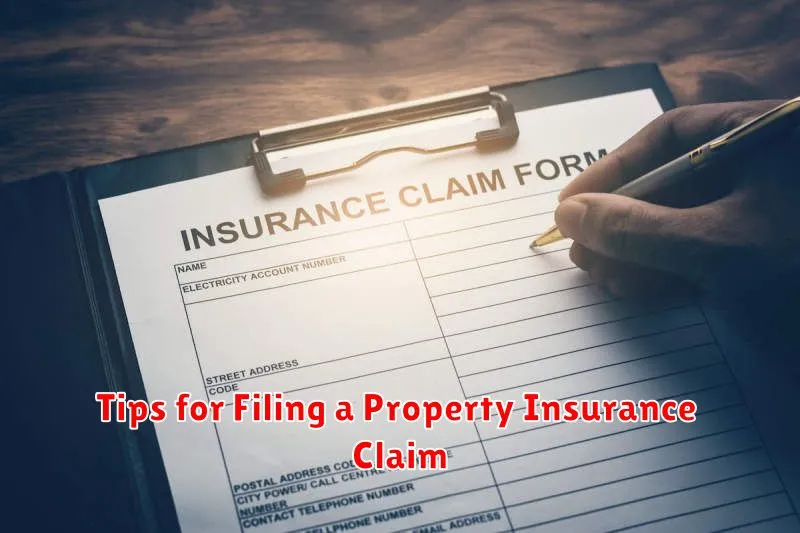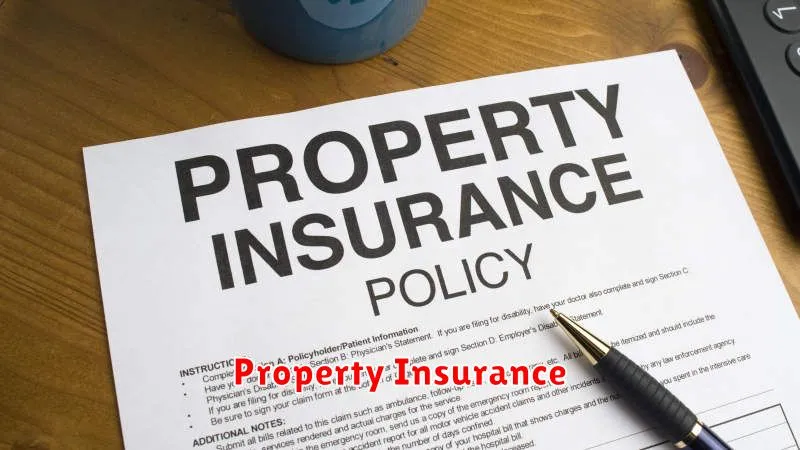Finding the right property insurance can feel like navigating a maze. With so many options, it can be overwhelming to choose the right coverage for your unique needs. You want a policy that adequately protects your home, belongings, and financial well-being, but you also want to avoid paying for unnecessary extras. That’s where these essential tips come in handy. This comprehensive guide will equip you with the knowledge and strategies needed to select the most suitable property insurance policy for your needs.
From understanding the different types of coverage to negotiating the best premium, we’ll break down the process step by step. We’ll also explore key factors to consider, such as your location, the age and value of your property, and your personal risk tolerance. By following these tips, you can confidently navigate the insurance maze and find a policy that gives you peace of mind and financial security.
Understanding Your Coverage Needs
Before diving into the specifics of different insurance policies, it’s crucial to understand your coverage needs. This involves evaluating your property’s unique characteristics and your individual risk tolerance. Consider factors like:
- Property Type: Is it a single-family home, condo, apartment, or commercial building?
- Location: Where is your property located, and what are the potential risks in that area (e.g., earthquakes, floods, hurricanes)?
- Value of Property: What is the market value of your property, and what are the costs of rebuilding or replacing it?
- Personal Belongings: What valuable possessions do you own, and how much are they worth?
- Liability Concerns: What are your potential liability risks (e.g., guests getting injured on your property)?
- Risk Tolerance: How comfortable are you with the possibility of financial losses in case of a disaster?
By carefully considering these factors, you can identify the essential coverage areas you need and prioritize your insurance needs accordingly. This will help you narrow down your options and make informed decisions when comparing different policies.
Types of Property Insurance Policies
Navigating the world of property insurance can feel overwhelming, especially when faced with the various policy types available. Understanding the different types of property insurance policies is crucial in selecting the right coverage for your needs and ensuring adequate protection for your valuable assets. Here’s a breakdown of the common types of property insurance policies:
Homeowners Insurance: This comprehensive policy provides coverage for your dwelling, other structures on your property, personal belongings, and liability protection. It’s designed to cover a wide range of perils, including fire, theft, vandalism, and natural disasters.
Renters Insurance: As a renter, you’re responsible for protecting your personal belongings. Renters insurance provides coverage for your furniture, electronics, and other possessions in case of damage or loss. It also offers liability protection, safeguarding you against claims arising from accidents on your property.
Condominium Insurance: Designed specifically for condominium owners, this policy covers your individual unit and personal belongings. It typically includes coverage for damage caused by fire, water, and other perils, but it does not cover the building’s structure, which is usually insured by the homeowners’ association.
Flood Insurance: Flood insurance is a separate policy that protects your property against flood damage. It’s essential for homeowners in flood-prone areas, as standard homeowners insurance policies generally do not cover flood damage.
Commercial Property Insurance: This policy protects businesses against losses to their buildings, equipment, inventory, and other assets. It covers perils like fire, theft, vandalism, and natural disasters, as well as liability claims from customers or employees.
Specialized Property Insurance: Beyond these common types, various specialized property insurance policies exist, tailored to specific assets or industries. These can include insurance for boats, classic cars, fine art, and other valuable items.
Understanding these different types of property insurance policies is the first step towards making informed decisions about your coverage. Consulting with a knowledgeable insurance agent can help you determine the best policy options for your specific needs and ensure you have the right protection in place.
Factors Influencing Insurance Premiums
Understanding the factors that influence insurance premiums is crucial for selecting the right property insurance policy. These factors determine the cost of your coverage and can vary significantly based on your individual circumstances. Here are some key aspects that insurance companies consider when calculating your premiums:
Location: Your property’s location plays a significant role in premium determination. Areas prone to natural disasters like earthquakes, hurricanes, or wildfires generally have higher premiums due to the increased risk of claims.
Property Type and Value: The type and value of your property are major considerations. Homes with higher market values or those with unique features often command higher premiums. The age and condition of your property also factor in, with older or poorly maintained properties attracting higher premiums.
Coverage Amount and Deductible: The amount of coverage you choose and the deductible you select directly influence your premium. Higher coverage amounts usually result in higher premiums, while a higher deductible typically leads to lower premiums.
Risk Factors: Insurance companies assess various risk factors associated with your property and your personal history. This includes your credit score, claims history, and safety features installed in your home. A strong credit score and a clean claims history can lead to lower premiums.
Insurance Company and Policy Type: Different insurance companies have varying risk appetites and pricing models. The type of insurance policy you choose, such as comprehensive or basic coverage, also affects the premium. It’s essential to compare quotes from multiple insurers to find the best rates.
By understanding these factors and their impact on premiums, you can make informed decisions when selecting your property insurance policy. Consulting with an insurance agent can help you navigate these complexities and find the coverage that meets your specific needs and budget.
Evaluating Coverage Limits and Deductibles
When choosing property insurance, determining the right coverage limits and deductibles is crucial. Understanding these elements is vital to ensure your policy effectively protects your property in case of an unexpected event.
Coverage limits define the maximum amount your insurance company will pay for a covered loss. It’s essential to consider the replacement cost of your property, including the structure, contents, and any additional features like landscaping or outbuildings. Make sure the coverage limit is adequate to rebuild or repair your property to its pre-loss condition.
Deductibles are the amounts you pay out of pocket before your insurance kicks in. Choosing the right deductible involves a balance. A higher deductible usually means lower premiums, but you’ll have to pay more upfront in case of a claim. Conversely, a lower deductible translates to higher premiums, but you’ll pay less out of pocket. Consider your financial capacity and risk tolerance when selecting a deductible.
Here are some factors to consider when evaluating coverage limits and deductibles:
- Value of your property: Assess the replacement cost of your home, belongings, and any other structures on your property.
- Your financial situation: Evaluate your ability to pay a deductible in case of a claim. A higher deductible might be suitable if you have a comfortable emergency fund.
- Your risk tolerance: Consider how comfortable you are with potential out-of-pocket expenses in case of a loss. A lower deductible might be preferable if you want greater financial protection.
- Insurance premiums: Compare premiums for different coverage limits and deductibles to find the best balance for your needs.
By carefully evaluating coverage limits and deductibles, you can ensure your property insurance policy provides the necessary protection without exceeding your budget. Remember, it’s always wise to consult with an insurance agent to discuss your specific needs and receive personalized advice.
Researching and Comparing Insurance Providers
Once you have a general understanding of your insurance needs, it’s time to start researching and comparing different insurance providers. This is a crucial step in finding the best policy for your property. Begin by making a list of potential providers, considering factors like reputation, financial stability, and customer satisfaction. You can use online resources, such as insurance comparison websites, to quickly compare quotes from multiple providers. These websites often allow you to filter your search based on specific criteria, making it easier to find options that align with your requirements.
Don’t just rely on online quotes alone. Take the time to contact each provider directly to ask questions and discuss your specific needs. This allows you to gain a deeper understanding of their policies and coverage options. Ask about discounts, deductibles, and coverage limits, as these factors can significantly impact the overall cost of your insurance. Be sure to inquire about their claims process and customer service reputation. It’s also important to review the insurer’s financial stability. Look for companies with strong financial ratings, as this indicates their ability to pay claims in the event of a disaster.
When comparing quotes, ensure you are comparing apples to apples. Make sure the coverage levels, deductibles, and policy terms are similar across all providers. Avoid choosing an insurer solely based on the lowest premium. Instead, focus on finding the right balance between price and coverage, ensuring you have adequate protection for your property. Remember that a policy that seems too good to be true often comes with hidden costs or limited coverage. Be thorough in your research and choose a provider that offers comprehensive coverage at a competitive price.
Reading the Fine Print: Exclusions and Limitations
While property insurance offers valuable protection against unforeseen events, it’s crucial to understand the exclusions and limitations within your policy. These clauses specify what events or damages are not covered, preventing you from facing financial hardship when you need coverage the most.
Some common exclusions include:
- Acts of War: Damage resulting from war, terrorism, or military action.
- Natural Disasters: Certain policies may exclude coverage for specific natural disasters like earthquakes or floods, requiring separate coverage.
- Negligence: Damage caused by your own negligence, like forgetting to turn off a stove.
- Wear and Tear: Normal wear and tear on your property are generally not covered.
- Intentional Acts: Damage caused intentionally by you or someone you’re responsible for.
Limitations in your policy might include:
- Dollar Limits: Your policy might have maximum payout limits for specific events or categories of damage.
- Deductibles: You’ll likely have to pay a set amount out of pocket before insurance kicks in.
- Coverage Period: Your policy might have a specific duration, and coverage might expire after that time.
- Specific Perils: Coverage might be limited to certain perils, like fire or theft, excluding others.
Thoroughly understanding the exclusions and limitations of your property insurance policy is vital. This knowledge will help you make informed decisions about coverage, ensure adequate protection, and avoid unexpected financial burdens during a claim.
Bundling Policies for Potential Discounts
One of the most effective ways to save money on your property insurance is by bundling policies. This means combining multiple insurance policies with the same insurer, such as home and auto insurance. By consolidating your policies, you can often qualify for significant discounts. These discounts stem from the insurer’s reduced administrative costs and their increased confidence in you as a customer.
When you bundle, your insurance company often rewards you with lower premiums. You may even secure additional benefits like faster claims processing and dedicated customer service representatives. The exact discounts and benefits offered will vary depending on the insurer and the specific policies you bundle. To explore these possibilities, it’s wise to contact your insurer or shop around for quotes from different companies.
Reviewing and Updating Your Policy Regularly
Once you’ve secured a property insurance policy, don’t simply file it away and forget about it. Regular reviews are crucial to ensure your coverage remains adequate and aligns with your evolving needs. Make it a habit to review your policy at least annually, or even more frequently if significant life changes occur. This includes:
- Major renovations or additions: These can impact the value of your property and the level of insurance required.
- Changes in your assets: If you’ve acquired valuable items, such as jewelry or artwork, ensure they are adequately covered.
- Market fluctuations: Inflation can erode the value of your policy over time, potentially leaving you underinsured. Consider increasing your coverage limits to match the current market value of your property.
- Changes in your living situation: If you’ve moved, remodeled, or changed your occupancy status (e.g., renting out a portion of your home), adjust your policy accordingly.
Don’t hesitate to contact your insurance agent to discuss any updates or modifications to your policy. They can help you understand your coverage limits, deductibles, and any relevant exclusions, ensuring you have the right protection for your property and peace of mind.
Seeking Professional Advice from Insurance Agents

While you can gather information about property insurance online, nothing beats the personalized guidance of an experienced insurance agent. They’re not just salespeople; they’re your advocates, offering tailored advice based on your specific needs and circumstances. Here’s why consulting an insurance agent is crucial:
Understanding your coverage options: Property insurance policies can be complex, with various coverage types and exclusions. An agent can explain these nuances, helping you choose the right policy that aligns with your unique property and risk profile.
Tailoring your policy: Every property is different, and so are the risks associated with it. An agent can help you customize your policy to cover specific elements like valuable belongings, additional living expenses, or specific hazards like floods or earthquakes.
Negotiating rates: Insurance agents have strong connections within the industry and can often negotiate better rates and discounts than you might get on your own. They can also help you explore different insurance companies to find the most competitive options.
Helping you file claims: If you need to file a claim, having an agent on your side can significantly simplify the process. They can guide you through the paperwork, advocate for you with the insurance company, and ensure you receive the maximum benefits possible.
By seeking professional advice from a qualified insurance agent, you can navigate the complex world of property insurance with confidence. They can help you understand your options, choose the right coverage, and ensure you’re protected against unforeseen events.
Tips for Filing a Property Insurance Claim

Once you’ve chosen the right property insurance, it’s essential to know how to file a claim effectively. Here are some key tips:
1. Act Quickly: Notify your insurance company as soon as possible after the damage occurs. This ensures prompt action and prevents potential issues with your claim.
2. Document Everything: Take thorough photos and videos of the damage, including any injuries or personal belongings. This documentation serves as evidence for your claim.
3. Make a Detailed Inventory: Create a list of all damaged or lost property, including purchase dates and receipts if possible. This helps with accurate valuation.
4. Keep Records: Maintain records of all communication with your insurance company, including claim numbers, dates, and contact details. This ensures transparency and a clear timeline.
5. Be Honest and Accurate: Provide your insurance company with accurate information about the cause of the damage and the extent of your losses. False or exaggerated claims can lead to denial.
6. Understand Your Policy: Carefully review your insurance policy to understand coverage limits, deductibles, and any specific requirements for filing a claim.
7. Hire Professionals: If necessary, engage qualified professionals like contractors or appraisers to assess the damage. Ensure they are licensed and insured for your protection.
8. Negotiate Fairly: Be prepared to negotiate with your insurance company to reach a fair settlement for your losses. Don’t hesitate to seek guidance from an insurance expert or attorney if needed.

